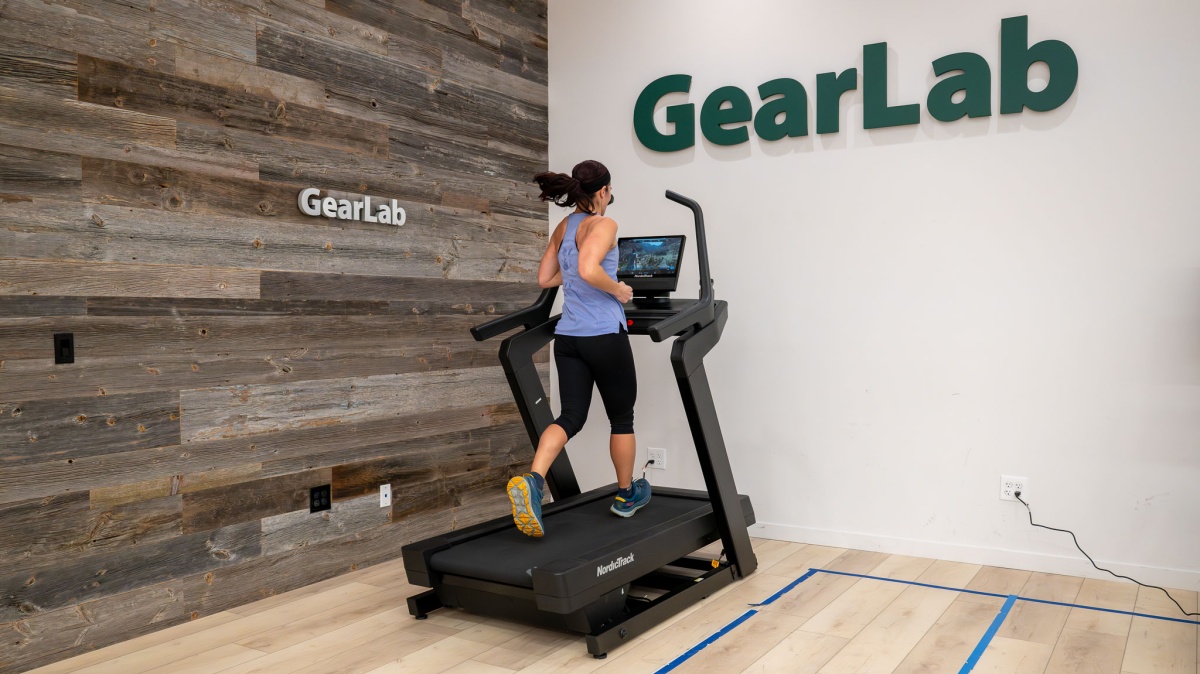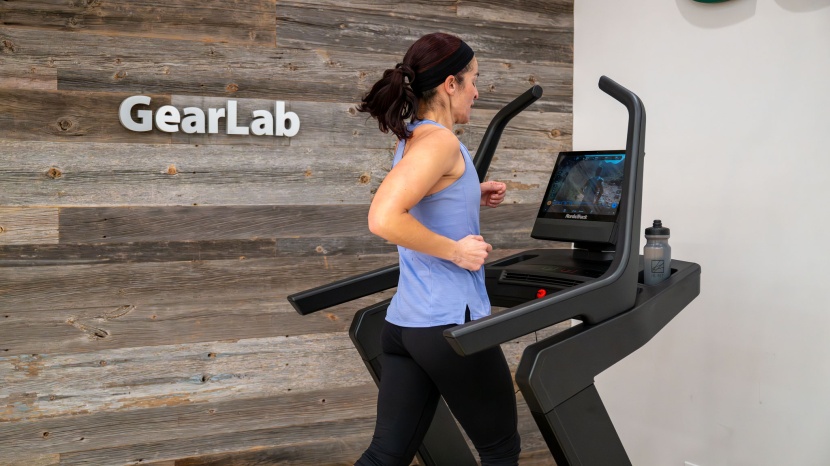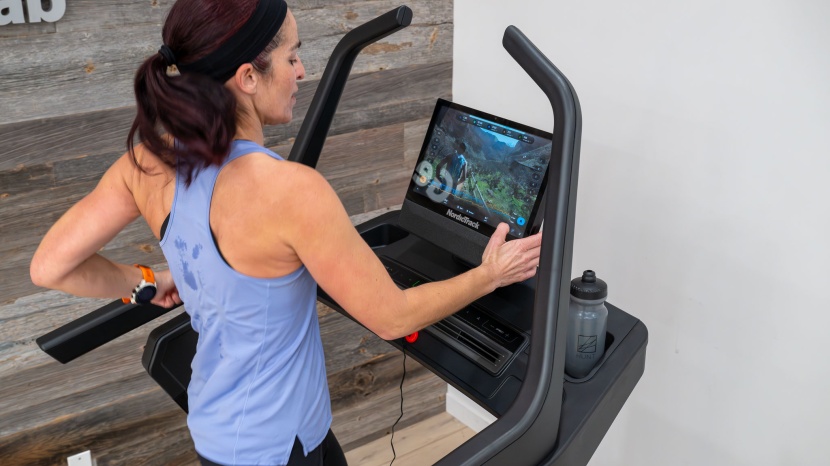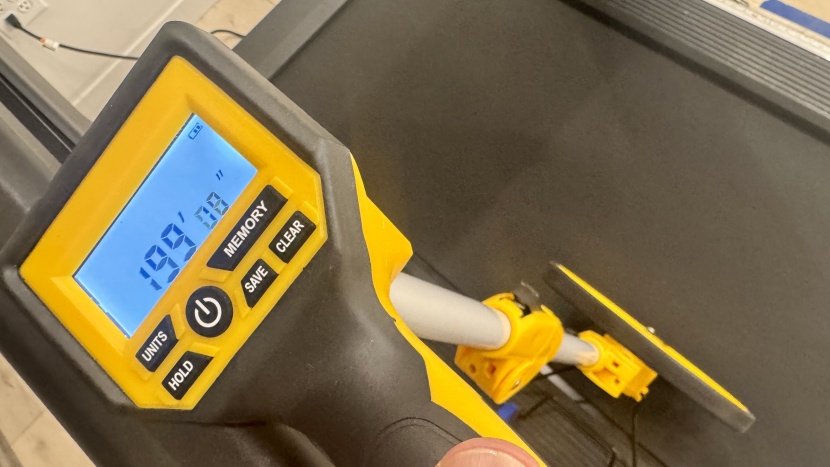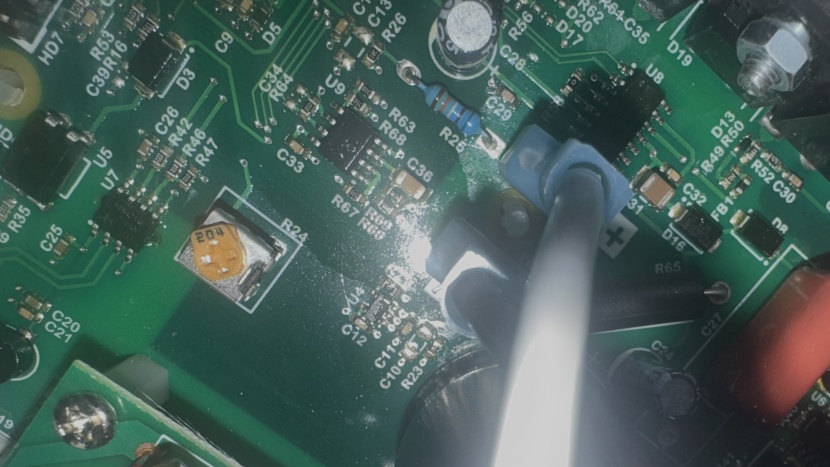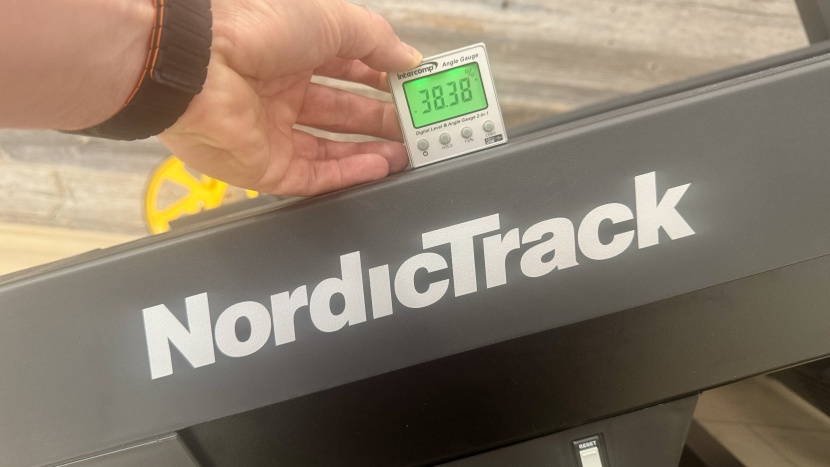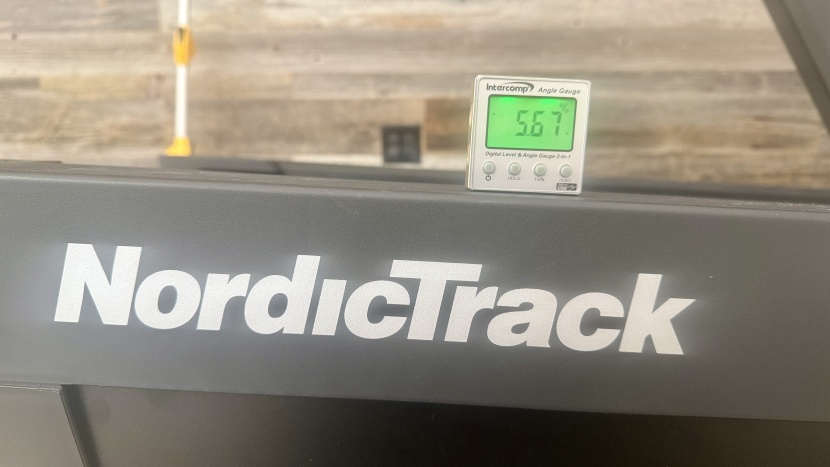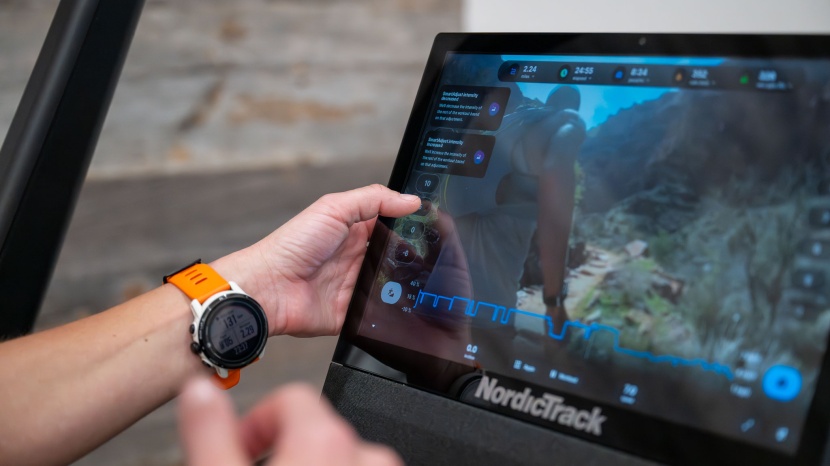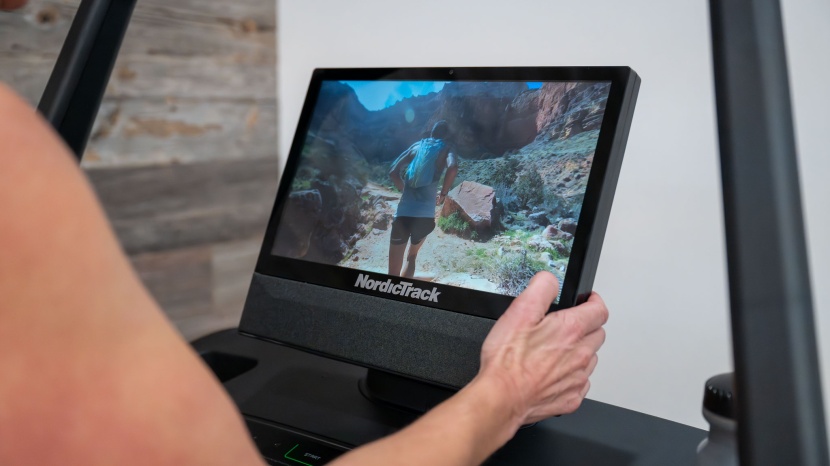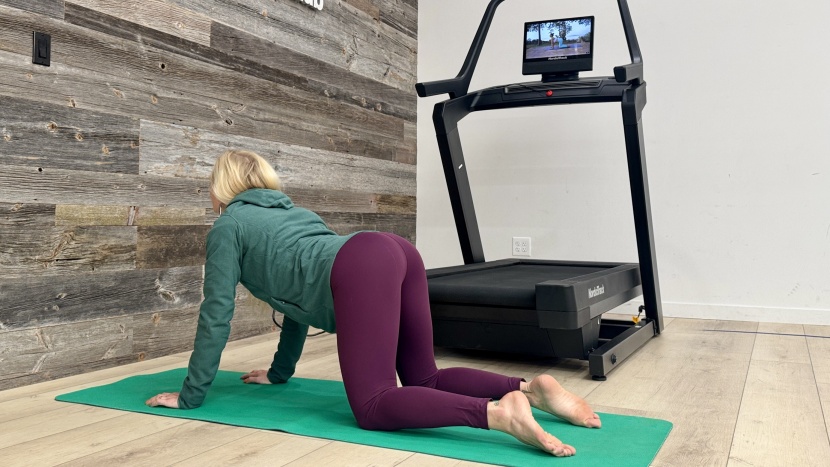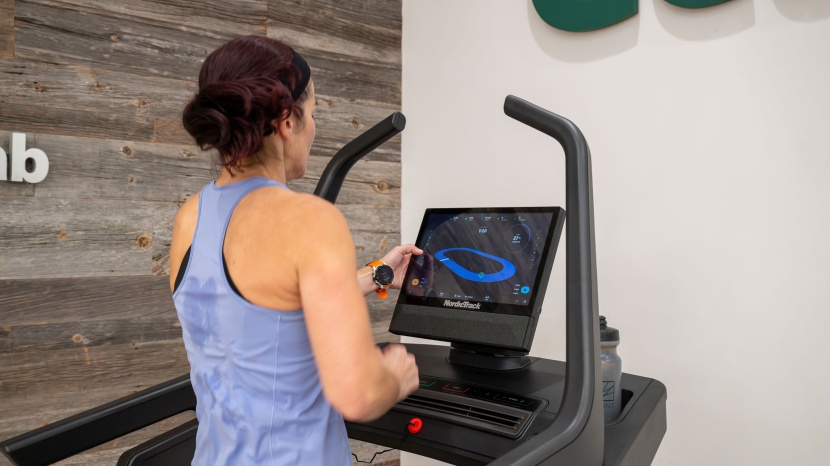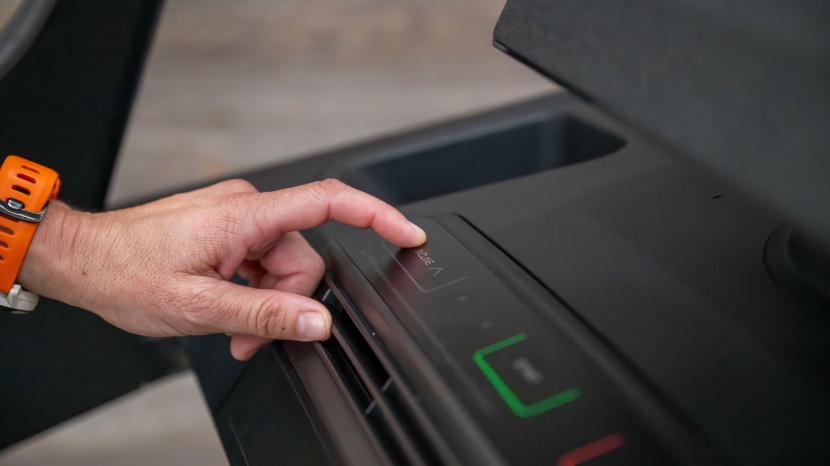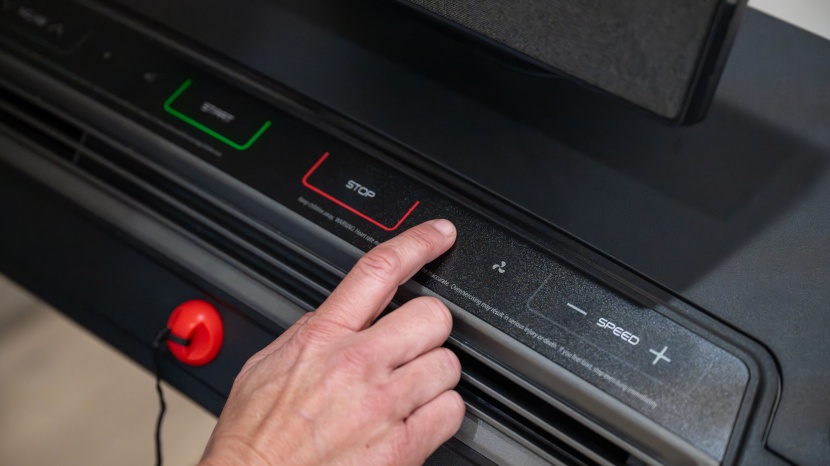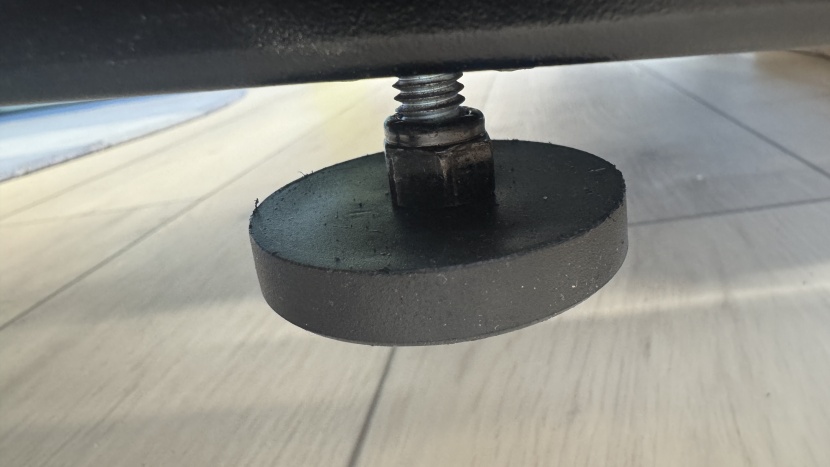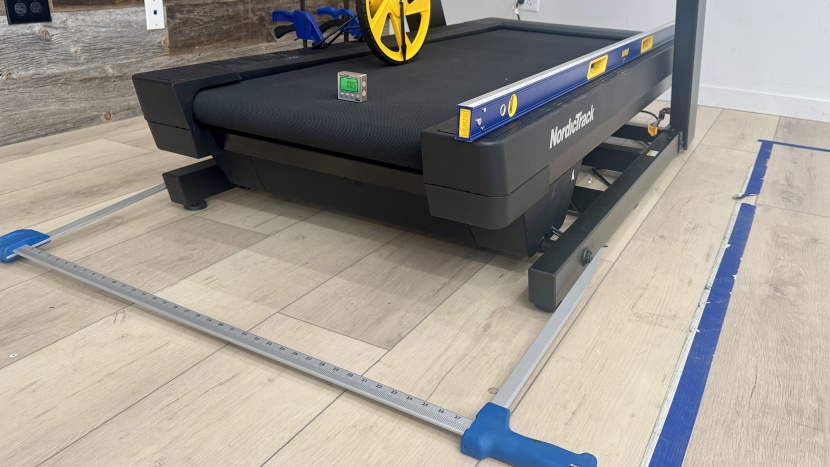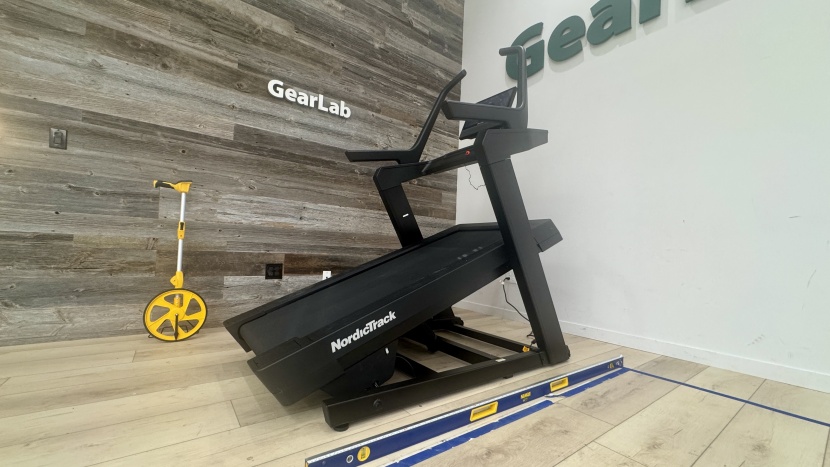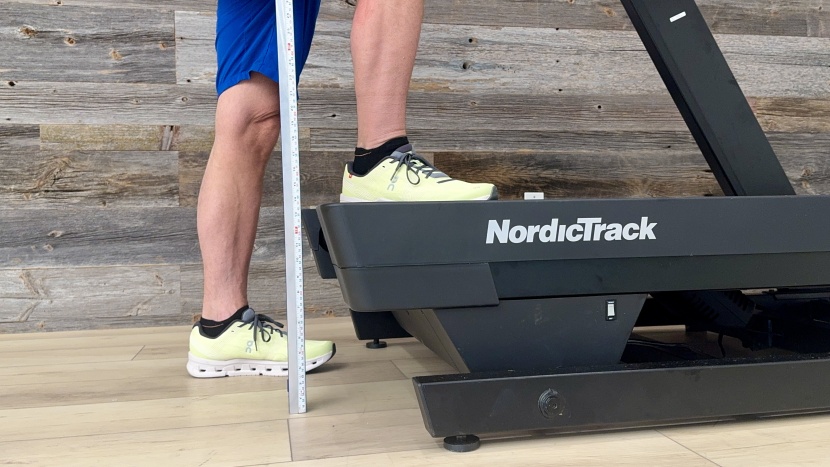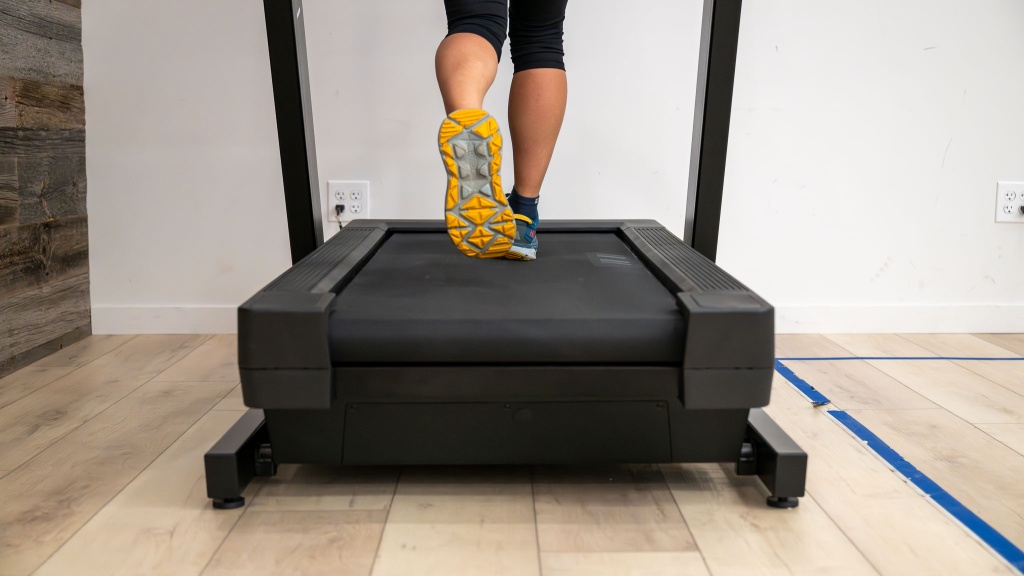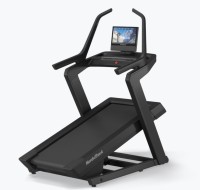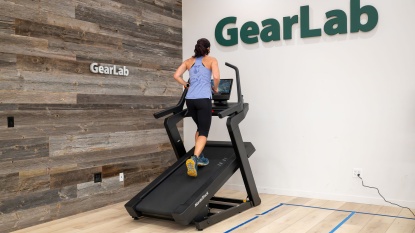
Our Verdict
Our Analysis and Test Results
NordicTrack's new X16 and X24 treadmills offer more capability than any previous model, differing only in screen size—so this review applies to both. The X16 is a high-quality, powerful machine that makes running feel premium and pairs perfectly with the immersive iFit subscription, which has kept me motivated for months. If you want to climb mountains from the convenience of your home, immerse yourself in iFit and burn your quads off on the X16.
Exercise Quality
The X16 is a phenomenal machine that can take your fastest runs and your hardest sprints. The wide incline range can create grades that feel almost impossible to run up. We loved getting lost in the runs on this machine; it's so large, comfortable, and entertaining that it's easy to zone out (or in) with the iFit workouts. The machine uses a 4.25 CHP (constant horsepower) motor, eclipsing the power of any other treadmill I've tested. You feel this power in the speed of acceleration and responsiveness; there is no lag or hesitation when you dig in. The motor features a flywheel on one side and a fan on the other, providing the belt with a smoother feel and keeping the unit cool during intense efforts. If you're using the treadmill for high-intensity training, the rapid changes in incline and speed are perfect for spiking your heart rate and dropping back into rest periods.
NordicTrack advertises a running deck that is 60 inches long by 22 inches wide, providing the X16 with a spacious running surface. The belt dimensions match those of the Sole F80and Horizon 7.4 AT, both of which allow unhindered, full-speed running. The layout of the X16's deck makes its running surface feel bigger; even if you're hugging the console, you'll be hard-pressed to kick the front of the machine. The gap between the running belt and side rails is wider than on most machines, which gives you less chance of kicking those rails. The large (63.5mm) rollers contribute to smooth motion and reduce belt wear.
You can take a brisk walk on the X16, but this machine is designed for all-out, hardcore training. With no stride restriction and speeds up to 12 mph, you can lay down a 5-minute mile without the anxious feeling you get on smaller decks. I felt faster than normal when I started using the machine and wondered if there was some magic to the deck, but my speed gains were fiction. I used a measuring wheel on the belt at various speeds to calculate the degree of calibration error in the machine. Our devices measured 496.11 feet of belt in 60 seconds at a speed of six mph. This showed the machine's accuracy was off by a little over 6%. Calibrating the machine involved getting access to the potentiometer on the main circuit board; this required a special order for a 14" long Phillips head screwdriver, but once adjusted, I got it within 0.5% of where it should be.
Deck Comfort
The running deck utilizes a new technology called SpringFlex, which NordicTrack claims is “designed to absorb impact and provide stability.” This differs from NordicTrack's previous RunnersFlex or RunFlex mostly in name. While previous types of deck cushioning have used four to six 12-19mm elastomers placed between the frame and deck, SpringFlex uses four ultra-soft elastomers, each 40mm thick. This provides a dampened platform for running or walking that flexes more in the center where your footfalls occur. Since the comfort of the deck is such an important aspect of your workout quality and cannot be adjusted, we have developed a method to measure all the treadmills we test, producing hard data. We designed and fabricated a custom, flexless platform specifically for this test. We then created a scaffolding and welded an adjustable cradle for a digital force meter to hover above the deck. The force meter indicates the amount of force required to flex the deck a predetermined distance. To create 1/2" of deflection in the center of the running deck required 720 Newtons of force.
So, what does this feel like? After spending considerable time on this machine and mixing it up with outdoor runs, there is a noticeable difference in how sore my legs are after a 5+ mile run. Our data shows slightly less compliance than the NordicTrack EXP 7i and Echelon Stride 6, which required 609 and 658 Newtons of force, respectively, but this isn't the full story. The X16 differs in design from most other treadmills; rather than multiple frame mounts and a motor up front, the deck is cantilevered from the rear, with the motor located beneath the belt. What is evident in the footage I took of runners' footfalls is that the entire cantilevered deck is in dynamic motion, providing more damping than the elastomers alone allow. The other benefit of cantilevering the deck from the rear is that the display isn't directly connected to the frame, so there was no noticeable screen movement, even while running at higher speeds.
Incline Range
The immense incline range is the big feature that sets the X-class treadmills apart. This feature lets you burn your quads like no other, but it also affects the space required to house it. At first glance, the machine's Sled Grips seem like a bizarre tribute to an antelope, but as you kick up the grade, you realize they are as necessary as trail-running poles in steep conditions. Maintaining a stride at an almost 40% grade is nearly impossible without using handles that resemble oversized parentheses around the console. As you kick up the incline to quad-busting extremes, the deck rises, and so do you. It's important to consider the height requirements for this machine. When our six-foot tester used the Sled Push feature with the deck at its highest incline, the top of his head measured 93.5" tall. The Sled Push feature is a low-speed, high-exertion workout that emulates pushing a sled. You can create a very intense calf workout by holding the tops of the Sled Grips and “pushing” the belt at a very steep angle.
We measured the deck's angle and found its terminal inclination to be 38.38% and the decline to be 5.67%. I could call out NordicTrack for not providing the 40% to 6% they advertise, but this range is more than sufficient for training. Multiple record-holding endurance runner Amber Weibel loves the decline feature for trail run training, but says she rarely exceeds a 25% incline. Pushing beyond 25% feels like you've veered off the trail and are attacking the summit in a completely unsustainable way. “I still got a thrill from using the steepest setting, but limited it to short bursts of cardio spiking output,” said tester Rachael Lamore.
Companion App/Connectivity
The X16 and X24 differ only in the size of their displays, and there may be a compelling reason to opt for the larger, more expensive screen. Once you've made your treadmill purchase, the ongoing costs of the companion app are not insignificant. Over many years, the extra price of the larger screen could be nominal. When we crunched the numbers on the 5-year cost of ownership, the 24" screen would cost you approximately $8 more monthly. The 16" HD touchscreen is impressive and sufficient, but the iFit workouts have such phenomenal production quality that viewing them on a larger, more immersive screen is incredible. If you're going to be spending a substantial amount of time on this machine, being able to immerse yourself fully in the workouts is priceless. Running with outstanding motivational trainers in some of the world's most beautiful locations feels like a virtual fitness travel experience. “I loved running the coast of Portugal or virtually training for the Boston Marathon; the footage is stunning, and the trainers are exceptionally good,” said Joshua Hutchens. We find iFit to be the most interesting and engaging app experience offered today.
Started in the 1970s, Weslo was the first iteration of iFit, which would later pair VHS machines with fitness equipment. They've come a long way and distinguish themselves from other studio-centric competitors today by offering a huge array of trainer-led workouts in breathtaking locations worldwide. There are literally thousands of engaging videos led by awesome trainers that tell captivating stories, share history, and offer training tips while exploring the world vigorously. The trainers bring personality, expertise, and local knowledge to each session, often sharing motivational stories and fun facts about the area. One of the things I like most about iFit is its accessibility to all fitness levels, from walking and hiking to sprints and ultra training.
When you're using the X16 with iFit, it automatically adjusts the speed and incline based on the workout you're doing and the direction of your trainer. If the trainer starts running faster, your belt speed increases; when the trail gets steeper, your incline ramps up. This allows for an incredibly immersive experience where you're not left futzing with dials or pushing buttons. If the trainer is running faster or slower than you'd like, you can adjust your speed or incline independently, and “Smart Adjust” will tailor the rest of the workout to your settings. There is a wide array of training programs, workout formats, and themed challenges to keep you engaged and motivated. iFit isn't limited to treadmill workouts; they offer cycling, yoga, strength training, and other guided fitness classes. To take advantage of off-treadmill classes, you can stand behind the treadmill or pivot the HD touchscreen for viewing from the side. This is a cool feature if you have the space, but you can also use your iFit membership on your tablet or smart TV.
App Cost
iFit membership costs $39/month and allows up to 5 user profiles. If you pay in advance, you can save a few dollars; the current promo offers 2 years for $29/month. There's a cheaper way to experience iFit, but it won't work on your treadmill screen. For $15/month, you can experience the app through your smartphone or tablet. This may be a good way to try the app before committing to a treadmill that relies heavily on the app. I say more or less because you can use the treadmill without an app; it's just not very engaging.
User Interface/Ease of Use
Your interface with the X16 is largely the 16" HD Touchscreen, but there are also a few physical buttons on the console. Whether you're using iFit or the machine's basic functionality, quick jump speed and incline shortcut buttons are located along the edges of the screen. When using iFit, these buttons aren't necessary, as your workout will make all the necessary adjustments through SmartAdjust. The controls aren't standout features for this machine, and it notably lacks handrail controls, which I've appreciated in other models.
The HD screen boasts excellent resolution and touch sensitivity, with minimal latency. Navigating the UI is easy, but the volume of classes offered through iFit can feel a little overwhelming. You can browse by categories such as run, walk, hike, strength train, active recovery, and many more. Once you've chosen a category, you can filter and sort by duration, intensity, activity, environment, language, and trainer. iFit currently offers classes in English, Spanish, French, Italian, Portuguese, German, Russian, and Mandarin. Under the display are two 5.1cm speakers that broadcast sound loud enough to be heard over the treadmill's noise.
Features
The main features of the X16 are its incredible incline range and SpringFlex running deck, but there are several other attributes worth discussing. The treadmill's AutoBreeze fan automatically adjusts based on your level of exertion; it's a small feature that was probably easy to engineer, but it's yet another way that the machine produces an immersive experience. The fan can also be adjusted manually with sweat-proof buttons on the console. Other sweat-proof buttons on the console allow you to increase or decrease speed and incline with simple + / - controls. The accessory tray has two recesses for a water bottle, phone, towel, and USB-C charging from the screen. As with other treadmills, a safety key connects to a lanyard that clips to your clothing; if the magnetic key is pulled from its slot, the treadmill quickly comes to a stop.
The X16's Touchscreen tilts and swivels 90 degrees. In theory, this adjustability should give the treadmill more versatility for off-treadmill classes, but the sled grips and accessory tray compromise the view of the screen when rotated 90 degrees. You can do off-treadmill workouts behind the machine if you have the space. NordicTrack recommends 8 feet of clearance behind the X16 and 2 feet on each side. Unlike most treadmills we've tested, the X series treadmills do not fold, so their footprints can't be reduced. There are wheels on the front of the frame that help to move the treadmill on hard floors, but lifting the back of the treadmill to engage those wheels is a job for two people. The frame features adjustable feet that enable you to level it on hard surfaces. NordicTrack recommends using a treadmill mat if you don't have solid flooring.
The console uses Bluetooth to connect to a heart rate monitor or headphones (available separately). Whether using Bluetooth headphones or the console's speakers, you can independently adjust the volume of the app, trainer, and music. An ActivePulse feature lets you pair a heart rate monitor (not included) with the machine, and it automatically tailors your workout to targeted heart rate zones. When you become saturated with classes and coaches, you can use your display to watch Prime Video or Netflix, provided you have subscriptions to those services. If you still crave more variety, iFit lets you create a Draw your own Mapin Google Maps and follow along with Google Street View. It's not totally seamless, but it expands your horizons. If you're using another fitness tracker or app, iFit can integrate with connected apps like Apple Health, Garmin Connect, Strava, and Google Fit.
Ease of Assembly
Sometimes, a video can convey all you need to know about a specific aspect of the machine. We shoot time-lapse videos of the assembly process, and while you can see exactly what was involved in the 62-minute assembly below, it's challenging to convey the sheer magnitude of the machine. The treadmill was delivered by semi-truck and brought through our roll-up door on a powered pallet jack. From there, we moved the 445-pound box inside our testing facility with another pallet jack; moving it without that tool would not have been possible.
This is the largest and heaviest treadmill we've ever tested. The NordicTrack manual advises against using the machine in a garage or covered patio, so consider placement carefully. You may also want to consider the amount of packaging disposal you'll need, as our crate, box, and substantial styrofoam were far too much for most residential trash services.
Nothing about the assembly was particularly difficult, but several steps involved heavy lifting. The running deck and frame are already assembled, and most of your tasks involve building the upper half of the machine. Several steps involve running wiring and holding pieces in place while securing hardware; therefore, having two people will make the process much easier. Printed instructions and tools are included, and the hardware is bubble-packed and easy to identify.
Storability
This isn't the metric where the X16 shines. The large machine measures 70.75" long by 38.5" wide. The top of the Sled Push handles hit the 75" mark on our tape measure. Notably, all dimensions are slightly larger than those suggested on the NordicTrack website. There is no folding feature or any way to reduce the machine's 2,722-square-inch footprint.
In short, the X16 is the least storable of the treadmills we've tested, but that's not necessarily a drawback. The treadmill design prioritizes use over storage, so if you're looking for a machine worthy of hardcore training, fitting it in a closet might not be necessary. The one aspect that really stood out in terms of the machine's size is its height; the deck has a 13" step-up height, and the sled grips are so tall that I wouldn't consider putting this treadmill anywhere with less than 8-foot ceilings.
Noise Level
The X16 feels like a gym-quality treadmill due to its imposing size and powerful motor. The design of this machine, with its large motor located under the deck, may help keep noise levels lower, but it will not go unnoticed. We measured the noise output of the treadmill with different runners at four mph; the average noise level was 63 dB. The noise level is roughly average compared to the other 13 treadmills in this test. Looking at the extremes in our noise testing reveals a difference of only 5 dB between the 60 dB Echelon Stride 6 and the 65 dB Peloton Tread.
Should You Buy the NordicTrack X16?
The NordicTrack X16 is more than just a treadmill; it is a significant commitment of both floor space and finances, including the ongoing subscription cost of the iFit ecosystem. Given its sheer size and weight, this isn't a machine you can easily move or resell if your interest in treadmill workouts wanes. However, for those dedicated to a premier fitness experience, the X-series remains one of the most comprehensive options on the market. After months of testing, I would actually recommend the X24 over the X16. The price difference is relatively nominal, and because both machines share the same footprint, the X24's larger screen provides a much more immersive experience without requiring extra space. While the X16's display is perfectly functional, the iFit scenery is so spectacular that you'll likely wish for the largest “window” possible. One final note: our unit arrived with its speed calibration slightly off—a frustrating flaw for a premium machine—though it was easily corrected with a $15 screwdriver and a few tutorial videos.
What Other Treadmills Should You Consider?
If you've read this far and liked the tremendous capabilities of the X16, you should also check out the BowFlex 22, which is also incredibly powerful, inclines up to 20 percent, and declines to -5%. The JRNY app can't compare with the production quality of iFit, but the machine itself is excellent. If devoting an entire room isn't your idea of a commitment to fitness, check out the Echelon Stride 6, which provides solid exercise quality, can be used with any app, and folds up and stores under a couch or behind a door.
| Awards | The Gold Standard for Performance Running |
|---|---|
| Price | $3,700 List |
Overall Score  |
|
| Star Rating | |
| Bottom Line | A top-tier fitness experience from a monster of a machine, with incline up to 40%, decline to 6%, and speeds up to 12mph, you can get lost in the immersive iFit experience |
| Pros | Compliant tread deck, iFit programming, 16-inch HD touchscreen, AutoBreeze fan, incredible incline range, auto-adjust speed/incline, 400-pound weight limit |
| Cons | Massive, expensive, app subscription, no scroll wheels or quick adjustment knobs, high step-up height |
| Rating Categories | NordicTrack X16 |
| Exercise Quality (35%) | |
| User Interface/Ease of Use (25%) | |
| Features (15%) | |
| Ease of Assembly (10%) | |
| Storability (10%) | |
| Noise Level (5%) | |
| Specifications | NordicTrack X16 |
| Measured Dimensions | 70.75" L x 38.5" W x 75" H |
| Belt Dimensions (LxW) | 60 in. x 22 in. |
| Top Speed | 12 mph |
| Measured Minimum Incline | -5.7 % |
| Measured Maximum Incline | 38.4 % |
| Measured Noise | 63 db |
| Motor power | 4.25 CHP |
| Weight Limit | 400 lbs |
| Display | 16" HD Touchscreen |
| Running Area | 1320 sq. in. |
| Assembly Time | 62 minutes |
| Footprint | 2722 sq. in. |
| Folded Dimensions | 70.75" L x 38.5" W x 75" H |
| Incline Adjustment | Electric |
| Workout Programs | iFit app (subscription required) |
| Heart Rate Sensors | No |
| Connectivity | Bluetooth, WiFi |
| Additional Features | Bottle holders, transport wheels, safety shutoff lanyard, AutoBreeze fan, dual speakers, USB-C charging, SpringFlex cushioning, Bluetooth, works with iFit |
| Warranty | Frame: 10 years, Motor: 2 years, Machine: 1 year |


